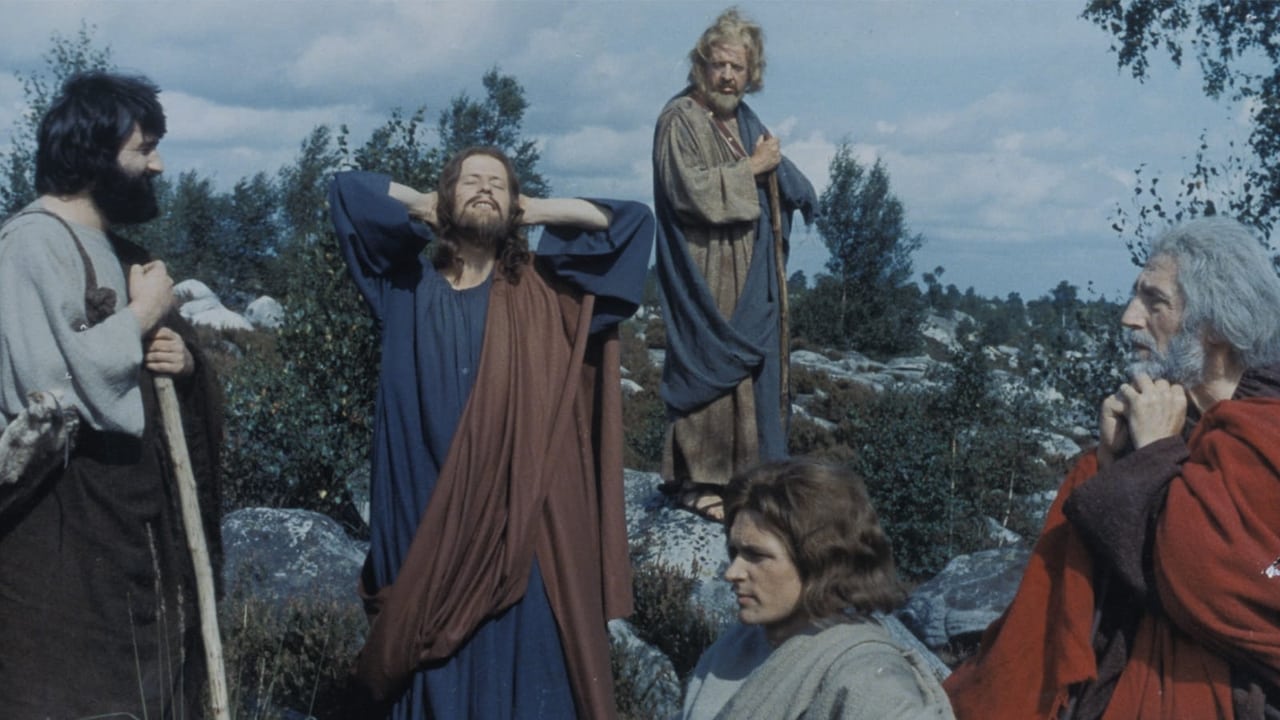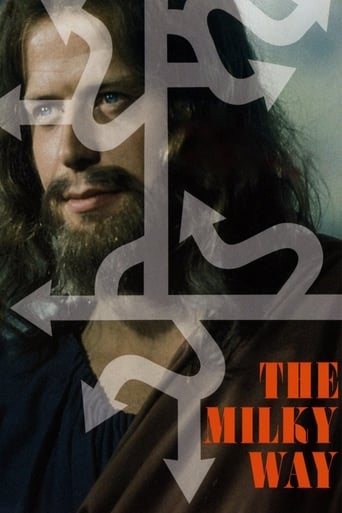Konterr
Brilliant and touching
Fairaher
The film makes a home in your brain and the only cure is to see it again.
Sabah Hensley
This is a dark and sometimes deeply uncomfortable drama
ma-cortes
Two drifters (Paul Frankeur and Laurent Terzieff) go on a pilgrimage from France to Santiago de Compostela in Spain. Along the way , they beg for food a man (Alain Cuny) with cape , hitchhike, and face the Christian dogmas and heresies from different Ages . Both of whom meet up with Jesus (Bernard Verley) showing off his abilities , Virgin Mary (Edith Scob) doing miracles , and the Marquis de Sade (Michel Piccoli) who is with a young girl in chains , a prostitute (Delphine Seyrig) and also Satan (Pierre Clementi) who appears during a car accident . This is a typical Buñuel film , as there are a lot of symbolism and surrealism , including mockery or wholesale review upon religion, especially Catholicism . Luis Buñuel was given a strict Jesuit education which sowed the seeds of his obsession with both subversive behavior and religion , issues well shown in ¨Milky way¨ . Here Buñuel makes an implacable attack to the Catholic church , theme that would preoccupy Buñuel for the rest of his career . Interesting and thought-provoking screenplay from the same Luis Buñuel and Jean Claude Carriere , Buñuel's usual screenwriter . After returning his native country, Spain, by making ¨Viridiana¨ this film was prohibited on the grounds of blasphemy as well as ¨The milky way¨ or Via Lactea , both of them were strongly prohibited by Spanish censorship . The stories in La Voie Lactée, (1969) are based on real historical episodes . Luis Buñuel and Jean-Claude Carrière did extensive research for the film, primarily in the Dictionary of Heresies by Abbé Pluquet. It is packed with surreal moments , criticism , absurd situations and religious elements about Catholic Church ; furthermore Buñuel satirizes and he carries out outright attacks to religious lifestyle and Christian liturgy . According to his autobiography, My Last Sight , Luis Buñuel got the idea of making the film after reading , Historia De Heterodoxos Españoles , by Marcelino Menéndez y Pelayo. Pretty good cast gives fine acting ; it is mostly formed by nice French actors such as Alain Cuny as Man with cape , Edith Scob as Virgin Mary , Bernard Verley as Jesus, Julien Bertheau as Hotel Maitre and Michel Piccoli as Marquis Sade , Pierre Clementi as Devil and Claudio Brook as Bishop .The motion picture was compellingly directed by Luis Buñuel who was voted the 14th Greatest Director of all time . This Buñuel's strange film belongs to his French second period ; in fact , it's plenty of known French actors . As Buñuel subsequently emigrated from Mexico to France where filmed other excellent movies . After moving to Paris , at the beginning Buñuel did a variety of film-related odd jobs , including working as an assistant to director Jean Epstein . With financial help from his mother and creative assistance from Dalí, he made his first film , this 17-minute "Un Chien Andalou" (1929), and immediately catapulted himself into film history thanks to its disturbing images and surrealist plot . The following year , sponsored by wealthy art patrons, he made his first picture , the scabrous witty and violent "Age of Gold" (1930), which mercilessly attacked the church and the middle classes, themes that would preoccupy Buñuel for the rest of his career . That career, though, seemed almost over by the mid-1930s, as he found work increasingly hard to come by and after the Spanish Civil War , where he made ¨Las Hurdes¨ , as Luis emigrated to the US where he worked for the Museum of Modern Art and as a film dubber for Warner Bros . He subsequently went on his Mexican period he teamed up with producer Óscar Dancigers and after a couple of unmemorable efforts shot back to international attention with the lacerating study of Mexican street urchins in ¨Los Olvidados¨ (1950), winning him the Best Director award at the Cannes Film Festival. But despite this new-found acclaim, Buñuel spent much of the next decade working on a variety of ultra-low-budget films, few of which made much impact outside Spanish-speaking countries , though many of them are well worth seeking out . As he went on filming "The Great Madcap" , ¨The brute¨, "Wuthering Heights", ¨El¨ , "The Criminal Life of Archibaldo De la Cruz" , ¨Robinson Crusoe¨ , ¨Death in the garden¨ and many others . And finally his French-Spanish period in collaboration with producer Serge Silberman and writer Jean-Claude Carrière with notorious as well as polemic films such as ¨Viridiana¨ , Tristana¨ , ¨The Discreet Charm of the Bourgeoisie" and his last picture , "That Obscure Object of Desire" .
christopher-underwood
I found this tale of a couple of tramp like figures ostensibly making a pilgrimage to Spain, interesting and amusing but by halfway was finding a lot of the dialogue annoying. Lots of religious diatribes and spouting and contradictions. I began to weary of the non-stop barrage of stupidity and then it gradually dawned on me that Bunuel was taking the p***. Indeed I note from the closing credits that all the dogma and seeming unbelievable tosh, were all exact quotes from religious tracts and writings throughout the history of Christianity. Bunuel has, in fact, very cleverly set up a believable tale, in which along the way he manages to get so much of this stuff said that it beautifully illustrates just how crazy some of this stuff is. Still not an easy first sitting but maybe with the knowledge gained a second viewing would be more enjoyable.
Cristi_Ciopron
The movie here is not an artistic creation, as it were; it is a skit. So, let's start with the most basics: is La Voie Lactee insulting for the Christians? Yes, it is. It is also a notable symptom of its time. On the other hand, it's surprisingly grim and stark mad and lacking a genuine inspiration or at least some valid wit. It is only venomous, weird and coarse.The first thing obvious when one studies the large savage attacks on Christianity and the clergy, by the surrealist masters like Luis Buñuel and Fellini, is the peripheral, marginal, cheap and frivolous, shallow character of the things aimed at: stuff on the outskirts ,treated with patent dishonesty and ill-will. In other words, the attack is so badly, so stupidly aimed, directed, that it's almost touching by its naive and uncultured poison. (Of course such attacks may and in fact are hurtful and harmful, especially with an equally uncultured and naive audience.)Luis Buñuel, the _undevout master,signs this receipt that recycles in mere lack of wit the vast majority of the cheap clichés of rabid anti—catholic propaganda. The movie looks almost like the adaptation of a 16th. century anti—Roman lampoon/ skit.His hatred damaged his integrity and pushed him towards infantile nonsense.It is stunning how little tries Luis Buñuel to understand something, anything about the Church (i.e., the Christianity as such),and how eager he is of engrossing huge amounts of the chaff and the offal and garbage of the most filthy, livid ,viscous anti—catholic hatred. After all, the man was the contemporary of several major creative Catholic and/or Christian theologians. His ignorance and complete lack of culture and wit are astounding.It is disgusting that Luis Buñuel identified with the generation that dreamed of shooting the Pope. After a decade, his dream came true. Luis Buñuel thought that shooting the Pope was fun; well,the thing was done. It was fun, wasn't it?Two more things:(1)—the Spanish scoundrel, prophesying in the manner of Caiphas (Jn.11:51 ff), foresaw the shooting of a Pope;the fact did not wait much until it happened; was Luis Buñuel proud and pleased that they shoot Popes?—;(2)—like Nietzsche, like Sade, like other of his forerunners, Luis Buñuel disliked the Christianity because of the alleged cruelty promoted; why, then, they themselves gave a large space for the enjoyment of the most bizarre cruelty in their own creations?—it is evident that Luis Buñuel himself delved in the most demoniac cruelty; this is the demoniac and ferocious side of Nietzsche, Sade, Luis Buñuel, Pasolini and other cultivators of the excesses. They opposed the Christian alleged cruelty—and did they promote the meekness instead? If daddy Bunuel disliked so much the (allegedly Christian) cruelty, why are his own movies so filled with it? Do you find his films full of meekness and goodness and tenderness? The man took a pleasure in cruelty, he savored it. He denounced it in others—and practiced it himself all the way! I guess he just wanted exclusivity. The Discreet Charm of the Bourgeoisie is a masterpiece; The Milky Way is a fanatical and cruel movie.This is how he saw,in the '60s, the place of the Christianity ?Then, he was a very uncultured, ignorant and demoniac person. The Milky Way is, for a lampoon, very grim, furious, ran off the rails, skid, biased and reckless—even if it comes from a deadly foe of the Christian principles. This time, his legendary hatred did not inspire him, the inimical charge against the Church is rather trite and cheap, the note is biased and grim ….
rogierr
Le fantôme de la liberté (Buñuel, 1974) seems to take off right from this film as if it were a sequel, visually and conceptually. This film however is much more determined to denounce the contradictions and hypocrisy of different religions, while Fantôme has even more artistic freedom. Also this is much more coherent and if there is any danger of getting heavy-handed, Buñuel knows how to joke himself a way out using illusionism or a mild shock-treatment. It is simultaneously very rational and miraculous. The anti-clericism and subversive desires frequently come to the surreal surface. I can't help but see this as an inspiration for Monty Python's 'Life of Brian' (1979), because that film also remotely feels like an off the wall road movie in which anything can happen.The subject matter was sort of tough for an atheist (heretic?) like me, but the humour with which Buñuel lets the characters throw the crucial differences between religions at each other is hilarious. E.g. in the middle of a duel between a Catholic and a Jesuit: 'Prior will is mere impulse. My thoughts and my will are not in my own power ... ma liberte est un fantôme.' 'What does freedom mean anyway? How can I be free if what I do is determined in advance?' etc. And why would all the personnel of a restaurant be caught up in an eloquent discussion about the existence of God while they are at work? See for yourself. Cinematographer Christian Matras (also Le Grande Illusion, 1937) continues to improve Buñuel's visual style using zoom-pan-zoom shots for instance, but keeps it sober.9/10

